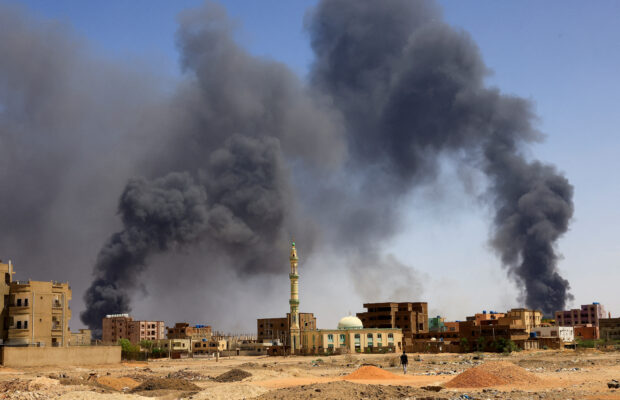Sudan battles risk exodus of 800,000 people – UN

A man walks while smoke rises above buildings after aerial bombardment, during clashes between the paramilitary Rapid Support Forces and the army in Khartoum North, Sudan, May 1, 2023. REUTERS/Mohamed Nureldin Abdallah
KHARTOUM — The United Nations warned on Monday that 800,000 people may flee Sudan as rival military factions battled in the capital despite a supposed ceasefire and foreign states wound down evacuations.
Hundreds of people have been killed and thousands wounded over 16 days of battles since disputes between the Sudanese army and the paramilitary Rapid Support Forces (RSF) erupted into conflict on April 15.
There seems little prospect of a quick resolution to the crisis, which has unleashed a humanitarian disaster, damaged swathes of Khartoum, risked drawing in regional powers, and reignited conflict in the Darfur region.
Both sides agreed on Sunday to extend a much-violated truce by 72 hours and the U.N. told Reuters they may hold truce talks in Saudi Arabia. But air strikes and artillery rang out on Monday as smoke hung over Khartoum and neighboring cities.
U.N. refugee deputy chief Raouf Mazou said his agency was planning for an exodus of 815,000 people including 580,000 Sudanese as well as foreign refugees now living in the country.
Article continues after this advertisementSome 73,000 have already left Sudan, he said.
Article continues after this advertisementSudanese who ventured onto the streets were shocked by the transformation.
“We saw dead bodies. The industrial area that was all looted. We saw people carrying TVs on their backs and big sacks looted from factories,” said resident Mohamed Ezzeldin.
Many fear for their lives in the power sruggle between the army chief and RSF head, who had shared control of government after a 2021 coup but fell out over a planned transition to civilian rule.
Tens of thousands of Sudanese have fled their homes, some congregating in hubs like Atbara northeast of Khartoum while they work out plans or head for the Egypt and Chad borders.
At least 528 people have been killed and 4,599 wounded, the health ministry said. The United Nations has reported a similar number of dead but believes the real toll is much higher.
Breaking point
Foreign governments have pulled out their citizens over the past week in a series of operations by air, sea and land, though several countries have ended efforts.
Those remaining face hardship and danger.
“I show up to work for two or three hours then I close up because it’s not safe,” said Abdelbagi, a barber in Khartoum who said he had to keep working as prices were rising.
Egypt said 40,000 Sudanese had crossed its border, while others have gone to Chad, South Sudan, and Ethiopia, or journeyed over the Red Sea on evacuation boats.
Power and water supplies are uncertain, there is little food or fuel, most hospitals and clinics are out of service and soaring transport costs are making it ever harder to leave.
The U.N. and other aid organisations have cut services, though the World Food Programme said it was resuming operations in more secure areas on Monday after staff were killed early in the war.
The U.N. fears for the war’s impact both on Sudan and the broader region, said Martin Griffiths, a senior official for humanitarian and emergency relief matters, warning the country was at “breaking point”.
“The scale and speed of what is unfolding in Sudan is unprecedented,” said Griffiths, who will visit Sudan on Tuesday. Agencies are importing supplies through Port Sudan, but need security guarantees to take them on to Khartoum.
Victoria, one of the tea sellers that used to dot Khartoum’s streets before the fighting began, said her children are struggling to understand what is happening.
“So I risk my life to try to work and if God helps me I’ll get them some food and if he doesn’t I’ll keep trying. But just sitting useless doesn’t help and being scared doesn’t help,” she said.
Violations
Jamila, a woman still in Khartoum with her family, is only eating one meal a day because so little food is available. RSF troops are stationed in front of their house and refuse to leave. “The sound of fighting is in our ears all day,” she said.
Both sides said on Monday they were making progress without commenting directly on the ceasefire violations.
The army said it had cut RSF’s combat effectiveness by half and stopped it trying to reinforce its positions in the capital. The RSF said it still controls main locations of Khartoum and was itself beating back army reinforcements.
Reuters could not verify either side’s claims.
Army leader General Abdel Fattah al-Burhan and RSF head General Mohamed Hamdan Dagalo, also known as Hemedti, have been under pressure to enforce a ceasefire and give safe passage for aid.
But though they have nominated representatives for talks on monitoring the ceasefire they have agreed, both are also digging in for what could be a protracted battle.
Burhan has said he would never sit down with Hemedti. The RSF leader said on Monday he would either hand Burhan over to justice – “or to the cemetery”.
In Khartoum, the army has been battling RSF forces entrenched in residential areas. Fighting has so far seen the more agile RSF forces fan out across the city as the better equipped army tries to target them largely by using air strikes from drones and war planes.